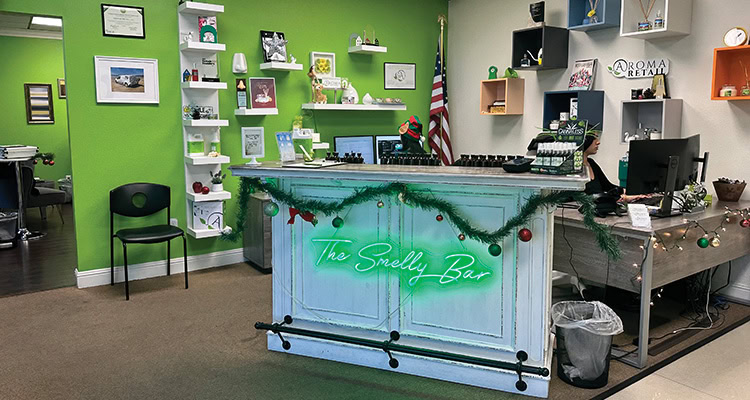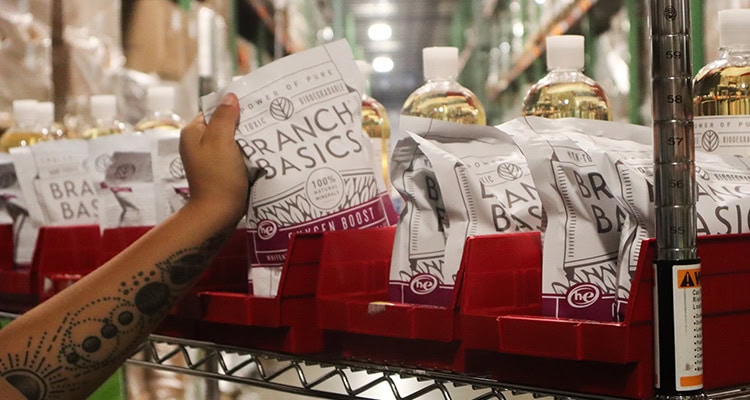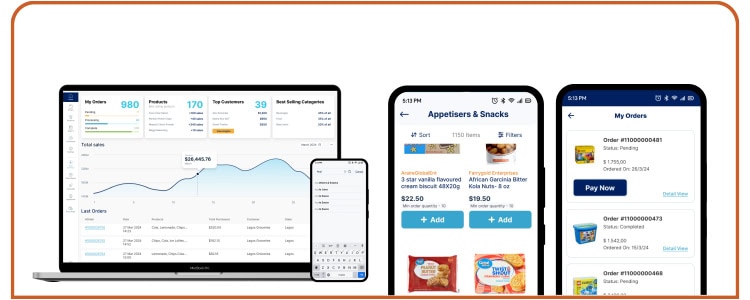Small Businesses, Big Supply Chains

From cloud-based shipping solutions to AI-powered inventory management, small businesses harness cutting-edge technology to scale like never before. Here’s how strategic partnerships, outsourcing logistics, and leveraging data-driven insights help SMBs streamline operations, meet demand, and enhance the customer experience—proving that size doesn’t limit success.
The thrill that an individual or group of investors experiences watching their small or mid-sized business (SMB) grow is almost second-to-none. Just as often, however, supply chain woes can temper that thrill. Challenges come on as fast as the orders come in if the small business failed to previously establish or explore effective partnerships and fulfillment solutions.
Navigating supply chain challenges doesn’t have to be overwhelming, though. With the right tools, strategies, and partners, SMBs can streamline operations, improve inventory management, and optimize shipping and delivery processes.
Leveraging technology, data insights, and scalable solutions can help level the playing field, enabling small businesses to compete with larger players while maintaining flexibility and customer satisfaction.
Add in a little foresight and planning, and SMBs can scale to meet demand just as nimbly as any large company.
Essential Partnerships

As a fledgling company, Aroma Retail, which operates out of a space known as The Smelly Bar, worked with Desartes to give customers greater shipping choices.
Aroma Retail is familiar with this scenario. The Las Vegas-based company started on founder Cristina Reding’s kitchen counter (literally) in 2017. Aroma Retail provides scenting solutions for homes and businesses, including pure-grade fragrance oils used by world-class resorts.
Launched as a tiny company, Aroma Retail’s order volumes exploded from a handful of orders shipped daily within the United States to 4,000+ domestic and international orders per month today. Initially the company offered a flat-rate parcel shipping fee, but that formula wasn’t conducive to success. It was also their customers’ top complaint.
“It didn’t matter where you were, our website offered a flat shipping fee. Sometimes we won, sometimes we lost,” says Jim Reding, who today serves as CEO of his wife’s thriving company.
To give buyers greater choice, Aroma Retail wanted a cloud-based, multi-carrier solution that could provide rate shopping during checkout. The big question was whether Aroma could find a provider willing to be a partner, as sometimes the company’s shipments—at least in the early days—amounted to just a few packages hastily dropped off at the post office at close of day.
When the fledgling company approached Descartes Systems Group, a logistics provider featuring a platform that integrates with multiple sales channels, including Amazon, eBay, and Shopify, Aroma Retail wasn’t sure its early modest volume would even garner attention. Their worries were unfounded.
“One of the most important differentiators we have is that no matter the size of the business, we reach out and help them get on board,” says Mikel Richardson, general manager of ecommerce for North America at Descartes.
From Tiny to Thriving
Finding and forging a relationship with a provider that features a model for small businesses can make all the difference. Descartes was accommodating, according to Reding, and its live-quoting function turned out to be a game-changer.
Aroma Retail was also able to gain access to boutique-style support. “It was important to us to have a way to send a label to a customer if they needed to return something,” says Reding. Descartes was able to provide that from the beginning.
Partnering with a provider that can service an SMB from inception and manage the aggressive growth trajectories that can sometimes occur is crucial.
Aroma Retail found that with Descartes. The cloud-based Descartes XPS™ multi-carrier parcel shipping solution has supported both seasonal peaks and marketing-driven volume spikes including an avalanche of orders that followed a promotional segment on a national morning television program. (See sidebar for details.)
Today, Aroma Retail operates out of a 13,000-square-foot factory and retail space known as The Smelly Bar, right off The Strip in Las Vegas. The Redings’ team of 25 employees ship packages all over the world every day. They have now served more than 100,000 customers—70,000 of whom make purchases at least twice a year or more.
“Our biggest challenge when we were a micro company was looking like we were a serious company that could take care of customers over the long term,” say the Redings. The image Aroma Retail projected was tied to its check-out process. The improvement paved the way to further growth.
Outsourcing Logistics

A partnership with ODW Logistics enabled Branch Basics to branch out into ecommerce channels.
SMBs might share humble origin stories but the supply chain approaches they adopt are ultimately as individual as they are.
Branch Basics is a non-toxic cleaning products company founded by three health-conscious women who never intentionally set out to market soap. However, consumer demand for natural and environmentally friendly cleaning products fueled demand. In order to meet it, the company engaged a third-party logistics (3PL) provider.
As a mission-based company, Branch Basics provides numerous resources to create a healthy home including a blog, a podcast, various guides, and a Toss the Toxins™ course, which are all accessible through its website. Primarily, the company considers itself an education platform.
“We just happen to sell cleaning products as the economic engine to drive our growth and to be able to create content centered around healthy living,” says Greg Bastian, president and chief financial officer for Branch Basics.
Enter ODW Logistics, which proved a cultural fit for the company. The 3PL admires Branch Basics’ conscious effort to make an impact. Prior to the partnership, Branch Basics operated out of three warehouses.
But ODW had a different plan: showcasing its 3PL capabilities, ODW demonstrated that Branch Basics could achieve efficiency and fulfillment by downsizing to a single node.
Smart Strategies For Achieving Goals

Crowdsourced delivery platforms such as Roadie help SMBs offer same-day delivery and easy returns.
ODW implemented standardized case labeling and created an invaluable item master that acknowledged changes in SKUs and how goods are packaged. Branch Basics is also appreciative of ODW’s freight brokerage services and less-than-truckload (LTL) capabilities.
When the partnership with ODW began, consumers could find Branch Basics products only on the company’s website. The company has since embraced the omnichannel world—a stated goal—and now sells its products on Amazon as well.
“Branch Basics now has a mindset where it can continue to accelerate business growth, says Casey Nofziger, vice president of business development at ODW Logistics.
Depending on the nature of their business, SMBs can face formidable and often expensive challenges scaling to meet demand during peak periods. Perhaps more significantly, the challenges they face typically lie outside their area of expertise.
For instance, a florist knows to manage inventory and schedule staff in anticipation of increased demand for Valentine’s Day and Mother’s Day, but its delivery fleet might be limited to one or two vehicles. An unexpected surge in orders, such as a hardware store responding to demand for pre-storm delivery of emergency supplies, can present the same challenge.
By outsourcing delivery, SMBs can serve a broader area within their community without the costs of owning and maintaining a delivery fleet. “This allows businesses to save on overhead and reinvest resources into growth while meeting customer expectations,” says Dennis Moon, chief operating officer at Roadie, a UPS company and crowdsourced delivery platform.
This approach also allows SMBs to keep essential staff focused on mission-critical roles such as assisting in-store customers or attending to a myriad of other business-specific tasks as opposed to handling deliveries.
A crowdsourced delivery platform like the one Roadie offers helps SMBs stand out by offering same-day delivery. Customers appreciate the convenience and it helps the SMB garner repeat business.
A service like Roadie also helps SMBs improve their returns experience by streamlining the process through a network of drivers equipped to handle items of all sizes, including furniture and appliances. Customers don’t need to box items and travel to a store, Moon says. Drivers handle returns directly, ensuring convenience for customers and efficient management for SMBs.
The ability to deliver a wide range of items on a timeline that meets shoppers’ expectations helps SMBs build trust and credibility. “It positions them as agile and resourceful, with logistics capabilities that rival those of much larger companies,” Moon explains.
Inventory Management Meets AI

Intelligent open commerce platforms such as RedCloud provide SMBs with advanced technology capabilities that can improve inventory efficiency and enhance competitiveness.
Large organizations have been in the AI game for a while, taking advantage of the massive amounts of data the technology enables to better understand their customers and dominate the ecommerce sector.
Meanwhile, SMBs struggle with disorganized data, a lack of resources and access to AI tools. The stakes are high for retail SMBs.
“One in eight consumers who walk into a store walk out without the product they were looking for,” says Justin Floyd, founder and CEO of RedCloud® Technology, which offers an open, transparent trading system known as an intelligent open commerce platform. That’s why it’s so critical for SMBs to gain advanced technology capabilities that can improve inventory efficiency.
The democratization of data, new AI tools, and open commerce will allow SMBs to trade freely, inventively, innovatively, and instantly across global supply chains, notes Floyd.
“In the brick-and-mortar space where, believe it or not, 92% of all retail sales still take place, acquiring this kind of data has been a big problem,” Floyd adds, referring to SMBs that run the gamut from delicatessens to mini markets, beauticians to pet shops and everything in between.
The open commerce initiative is about breaking down barriers and enabling companies to trade efficiently across the internet. The amount of consumer data collected from Meta and Google over the last 25 years is now publicly available in business environments, enabling SMBs to level the playing field.
Other advanced technologies are also having an impact: AI is revolutionizing open commerce for SMBs, providing cutting-edge technology to optimize operations and decision-making. With AI-driven data analytics, businesses can identify market opportunities based on real-time transaction data.
Putting AI to Work
AI-powered insights also enhance competitiveness by enabling SMBs to make informed decisions about product offerings and marketing strategies. AI tools also coordinate targeted promotions, helping businesses increase their visibility and engage customers effectively.
Generative AI enables smart inventory management by forecasting demand and automating restocking, dynamic pricing adjusts product price tags based on market conditions, and AI tools like 24/7 chatbots, virtual try-ons, and virtual assistants upgrade customer service. Meanwhile, advanced analytical intelligence can forecast sales and segment customers for more effective marketing optimization.
There is tremendous opportunity for SMBs to regulate the way they purchase their products using these new solutions, says Floyd: “With AI tools, they can gain greater control over the partners and manufacturers they deal with. Plus, it enables much smarter sourcing.”
Aggregating data and enabling all parties to leverage that data allows everybody to succeed. “What we’re trying to do with our open commerce platform is create a rising tide that lifts all boats together,” Floyd says. “It’s not a winner-takes-all situation.”
With widespread use of these tools, consumers will ultimately have a better experience when they go to a store. SMBs will have the right product at the right time in the right place. Suppliers and manufacturers will know what SMBs want and be able to provide it.
We have to look after small businesses, Floyd concludes: “They really are the backbone of the global economy. Open commerce enables them to trade in exactly the same way and on the same terms as the big players through the power of artificial intelligence and machine learning. Together, they provide valuable insights into product vulnerabilities and opportunities.”
The Smell of Panic–Then Success

Jim Reding, CEO of environmental scenting company Aroma Retail, admits that most of its peak sales period challenges are self-inflicted.
“Every Black Friday and Cyber Monday, we do a ridiculous amount of sales, but that’s something that we plan for throughout the year,” he says. However, the biggest episodic promotion Aroma Retail has done thus far is one that took them by surprise.
After being featured on the TV show Good Morning America in a “Deals and Steals” segment, Aroma Retail wound up processing orders totaling $250,000 in a single hour following its airing.
“The segment aired at 8:30 a.m. and by working through the night, we got the bulk of the orders out within a couple of days. But it took another few days to really dig out from under it,” Reding says.
Descartes XPS™—the cloud-based, multi-carrier platform Aroma Retail uses to provide ecommerce solutions—rose to the occasion, although there was an initial hiccup.
“It was user error, my mistake,” admits Reding. Similar to how a bank cuts off consumer credit cards if it detects unusual or heavy usage, Descartes institutes a cap when sales activity begins to climb at a higher rate than normal.
“Descartes simply needed to talk to someone in charge,” he says. “One phone call and it was resolved. Now we know to give them a heads-up next time we blow the roof off!”
